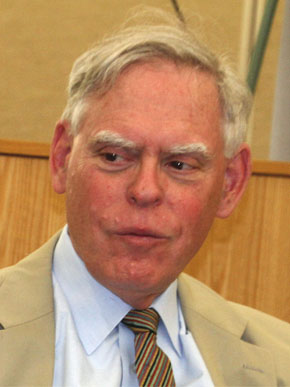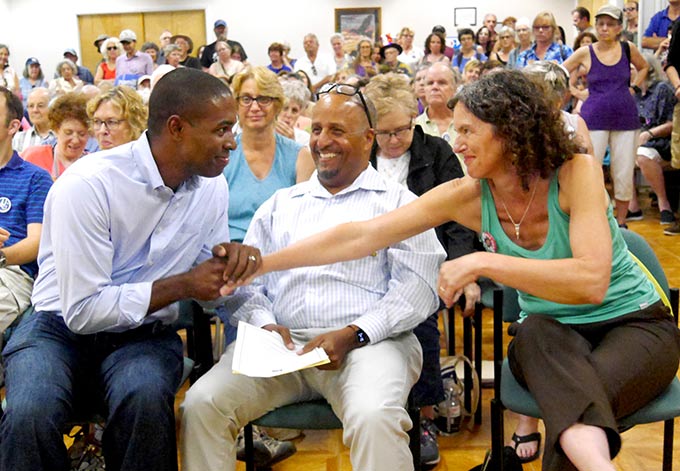
Antonio Delgado (photo by Will Dendis)
After a post-primary lull, the congressional race for New York’s 19th district is once again making news.
During the primary campaign, the main concern about eventual nominee Antonio Delgado was that he would, like the last two Democratic nominees, be open to the attack that he was a carpetbagger who moved to the district to run for office. Incumbent Republican John Faso did mention that on the evening of Delgado’s victory, saying “our neighbors do not look kindly upon candidates who have just moved into our district and presume to represent us.”
But the first major back-and-forth came a few weeks later after an article in the New York Post, headlined Rapping Dem challenges Republican for upstate congressional seat, listed some selections from Delgado’s 2006 rap album, including the lines: “I wanna ride with my n—-s see them all get figures/I wanna see a righteous capitalist, if it’s possible for one to exist” and “Dead presidents can’t represent me, not when most of them believe in white supremacy/like spittin’ on my ancestry.”
Faso’s response was swift. “In recent media reports, I was shocked and surprised to learn that Mr. Delgado authored some very troubling and offensive song lyrics,” said Faso in a statement to Ulster Publishing. “The tone and tenor of his lyrics, as reported, are not consistent with the views of most people in our district, nor do they represent a true reflection of our nation. Mr. Delgado’s lyrics paint an ugly and false picture of America.”
Delgado was quick to strike back. In an interview, the Schenectady native who moved to Rhinebeck shortly before announcing his candidacy said Faso’s remarks were part of a divisive and race-baiting strategy to paint him as an “outsider” in the largely white, largely rural congressional district.
“He’s feeding into racial biases that could be conscious or subconscious, that’s the unfortunate reality,” said Delgado, who gave up his hip-hop career to attend Harvard law school and go on to a career in corporate law. “A real leader, with integrity, would know better, would be better than that.”

Gerald Benjamin.
The New York Times covered the issue yesterday. That article included a quote from Gerald Benjamin, professor and director of the Benjamin Center at SUNY New Paltz, that proved controversial. From the article:
“Is a guy who makes a rap album the kind of guy who lives here in rural New York and reflects our lifestyle and values?” said Mr. Benjamin, a longtime political science professor, adding that he personally did not consider rap music to be “real music.”
“People like us, people in rural New York, we are not people who respond to this part of American culture,” Mr. Benjamin said
The college released a statement later that day, signed by Donald Christian, president, and Tanhena Pacheco Dunn, chief diversity officer, calling the quotes in the article “troubling” and saying they “[raise] the specter of racism and marginalize members of our community, both of which are antithetical to our institutional values of inclusivity and respect…We are disappointed that such language would come from campus leader and ambassador of the College.”
As for what’s next, “[S]ustained dialogue will continue to be part of our work as a campus as we work through free speech rights and manage intent versus impact of diverse views.”
According to the Daily Beast, Benjamin issued a memo to colleagues earlier today apologizing for the remarks.
“I have worked at SUNY New Paltz for fifty years in several capacities, and have a deep attachment to the school and the diverse community we have built here,” he wrote, according to the copy provided to that site. “I am therefore very sorry for any unintended distress caused by my remarks.”

On Sunday at the New Paltz Community Center, NY19Votes, IndivisibleNY19 and scores of activists from the Hudson Valley organized a Unity Day of Action to reach out to and engage voters in the upcoming primary and general elections. In this photo, 19th Congressional District candidate Antonio Delgado greets Jen Metzger, candidate for NY State Senate District 42. Sitting between them is Juan Figueroa, candidate for Ulster County Sheriff. (Lauren Thomas)
Delgado, after a weekend that included two enthusiastic events in Rhinebeck and New Paltz that have local Democrats fired up, has mostly sat back and watched the controversy play out. Meanwhile, Democrats have seized on Faso’s attacks and Benjamin’s remarks as racist. Tommy Vietor, former Obama staffer and host of the foreign policy podcast Pod Save the World, had this to say:
So @RepJohnFaso decided to run a racist, stupid campaign. Pretty much guarantees he’ll get his butt kicked. https://t.co/HbEL6CGIaS
— Tommy Vietor (@TVietor08) July 18, 2018

First, Gerald Benjamin’s assessment of the 19th District was (much like the previous attempts to compare the primary race in NY-14 to NY-19) wrong. While this district is primarily white, not urban, and has a rural landscape, it’s NOT rural in character. The district’s boundaries sprawl between two larger Metropolitan Statistical Areas; Albany/Capital Region to the north, New York City to the south. As a result, NY-19 (despite having a rural landscape) essentially functions as a “catch basin” for population overflow from larger, more urban areas (i.e. those who cannot afford rents in the urban core; weekenders/second homeowners; wealthy individuals with vacation properties). Therefore, it’s incorrect to identify the 19th as solely rural simply due to the abundance of raw land; We are, due to location, economically and politically tied to larger, more urban areas. As such NY-19 (in true Purple district form) is simultaneously rural and urban—a duality which manifests itself in many ways… I’m surprised that an academic, educated in political science and planning would be so glib in his description of this area (especially when he resides here himself)?
As for this whole rapping “controversy”, I confess I find it vaguely comical. Why? Well, It doesn’t matter if Antonio Delgado was a rapper, currently engages in rapping (or will rap in the future). It’s a non-issue being employed as a diversionary tactic (the purpose of which is to, once again, avoid discussing real issues and/or engaging in debate). Personally, being an amateur music connoisseur, I listened to a few tracks and thought: “Prolific lyrics, but the rhyme scheme/flow is mediocre”. I also wondered why it hadn’t been scrubbed yet? More than likely, Delgado’s team (very cleverly) left it there with the intention of capturing someone foolish enough to mention it (in a less-than-favorable light). It was largely ignored in the primary race because quite of few campaign managers probably took the same courses. Unfortunately/fortunately, for the ‘stable geniuses’ over at the Faso campaign, the rap album was just too juicy of (low-lying) mango to resist. Upon the first bite, they discovered what was on the label wasn’t in the tin. #Politics101
Now they are labeled racist—and worse yet, uncool. And racism aside, NOBODY wants to be uncool.
That said, I was puzzled as to why Faso’s friend, professor Gerald Benjamin, interjected himself into the discussion at all? He said he didn’t care for rap and felt it wasn’t “real music”. He’s entitled to his opinion (wrong as it is), but that has nothing to do with MY (or anyone else’s) vote. It also doesn’t change John Faso’s pitiful record. It was just a cringeworthy, Foster Friess-esque moment which cast a shadow on both Gerry Benjamin and John Faso. A stunt that backfired: leaving Delgado (smiling, hardworking and relevant) juxtaposed to John-the-Agrophobe spewing (vis-à-vis a “friend”) Puritanical nonsense about the evils of rap music (which he doesn’t listen to and won’t discuss).
Ironically, I’m not sure who benefits from this smokescreen more John Faso or Antonio Delgado?
Finally, on an aside, (obviously I’m not voting for him but) if Faso is to remain even marginally competitive in this race he must stop hiding from Antonio Delgado. Paul Ryan’s PAC, Faso’s financial supporters, and beleaguered friends cannot (and should not) run his race for him. That means holding town halls, debates, and (as painful as it might be) talking to his constituency. A political race is essentially a job interview with the district—and showing up is not optional.